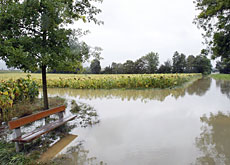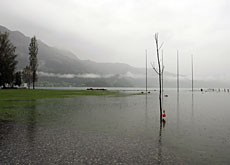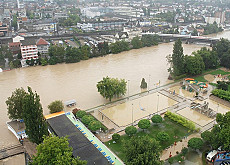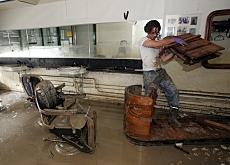Swiss examine flood control measures

As the flood situation slowly stabilises and clean-up operations get underway, experts have begun asking how the country can better prepare against future flooding.
The Federal Environment Office announced on Friday that, together with the cantons, it was keen to draw lessons from the recent storms and flooding – Switzerland’s worst for two years.
Water levels rose and many lakes and rivers burst their banks on Thursday after two days of torrential rain across the country. Particularly hard hit were northwestern Switzerland and the central plateau.
Hundreds of people were evacuated, at least 10 people, including two firefighters, were injured, but no deaths were reported. Fears of a repeat of the widespread destruction caused by massive flooding in 2005 were largely avoided.
As an initial follow-up, the Federal Environment Office said it wanted to examine river and canal dykes, such as those along the River Aare, some of which date back to the 19th century and are no longer safe.
According to federal experts, the recent floods highlighted several weaknesses and the dykes needed to be rehabilitated.
Hydrological forecasting, which enables cantonal and communal authorities to make quick decisions whenever there are high floodwaters, is also a possible area for improvement.
Andreas Götz, vice-director of the Federal Environment Office, admitted on Swiss television that the current high water levels were partly down to imprecise forecasts.
The office had expected the level of the River Aare to peak later, which meant that Bern authorities opened sluice gates too late and allowed too much water to flow into canton Aargau, the “Tageschau” programme reported.
Disaster reduction
Andreas Knutti, a water expert with Worldwide Fund (WWF) Switzerland, was critical of the country’s flood protection methods.
“Flood control measures and hydraulic engineering have clearly been going in the wrong direction for the past 200 years,” he told swissinfo.
According to Knutti, as Swiss rivers no longer have enough room, fast-rising floodwaters have nowhere to run off. Also, there is a “lack of political will and money” to implement proper natural flood protection measures.
But a United Nations official said the country’s preparation for natural disasters had kept the devastation from being worse.
“Switzerland is among the most prepared of countries,” said Reid Basher, an official at the International Strategy for Disaster Reduction, a UN body that coordinates global planning for catastrophes. “It has excellent organization [and] good technology; it has spent quite a lot of money protecting its communities.”
Basher said Swiss preparedness limited the damage and helped the country avoid some of the extreme devastation caused by previous floods. The country excels in managing rivers, mapping flood-prone areas, applying good zoning regulations and managing landscape to enhance natural flood-controling features like forests and wetlands, he said.
“You can’t get rid of the problem totally, but you have to be prepared,” Basher said. “The Swiss have invested money in it. They’ve got the expertise. That’s a good combination.”
swissinfo with agencies
The Swiss Solidarity Foundation, has issued a reminder that it already has a fund-raising campaign after the June floods in Switzerland, which affected the Emmental and Entlebuch regions as well as parts of canton Schwyz.
The foundation led by swissinfo’s parent body, the Swiss Broadcasting Corporation, said the account for donations was Swiss Solidarity 10-15000-6 “Natural Disaster Switzerland”.
Together with partner organisations Caritas (Catholic charity) and the Swiss Red Cross, Swiss Solidarity provides fast and unbureaucratic aid in cases of hardship.
The worst appears to be over, according to experts.
In the capital, Bern, the water in the River Aare has receded to under the danger level, said the emergency services.
Thun’s lake and Basel’s river levels are also no longer critical, said the local authorities, although both were still very swollen.
Lake Biel, which reached a record high of 430.9 metres on Thursday, has continued to steadily recede.
The French-speaking part of the country also reported that situation had eased, although the emergency services remain in action.
Insurers said the total cost of the damage is likely to exceed SFr200 million ($167 million). The Swiss farmers association says the costs could be as high as SFr5 million.
Meanwhile, the transport situation has almost returned to normal, with the Swiss Railways reporting that most of the main lines were running as usual. However, trains on the Bern-Fribourg line were stopped again on Friday.

In compliance with the JTI standards
More: SWI swissinfo.ch certified by the Journalism Trust Initiative



You can find an overview of ongoing debates with our journalists here . Please join us!
If you want to start a conversation about a topic raised in this article or want to report factual errors, email us at english@swissinfo.ch.